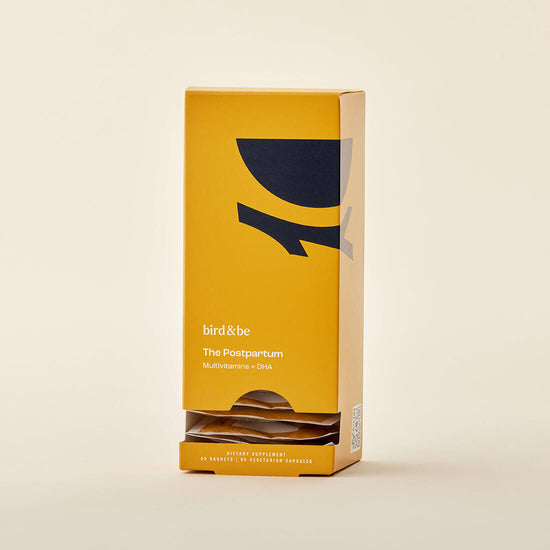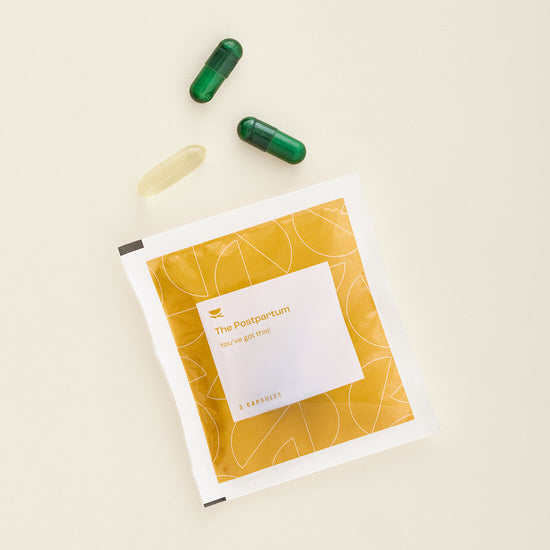Giving birth—no matter how it went down or how long it took—takes a huge physical, mental and emotional toll. Your body goes through a ton of changes to create a brand-new human being and then again to bring that life into the world.
But it doesn’t end there. The postpartum period requires recovery and a lot of adjustment, because though you might not be pregnant anymore, your hormones are still fluctuating, your lifestyle is changing, and if you’re chest/breastfeeding, you’re providing nutrients for two.
Why do I need a postpartum supplement?
You may have heard of “the fourth trimester,” which refers to the three months after you’ve given birth. This is a major adjustment period for you and your baby/babies, and there are many reasons to give your physical and emotional health a little extra love.
For one, your body is experiencing the effects of hormones like prolactin and its functions require a great deal of energy. Prolactin is the hormone that’s responsible for milk production. If you’re exclusively breastfeeding, your milk-producing postpartum body requires about 500 to 640 additional calories (kcal) per day compared to your pre-pregnancy body, which is about 300 calories more per day than you needed in your second and third trimester of pregnancy.
If you’re breastfeeding, your nutritional status will affect that of your milk. Iron, Vitamin D, Vitamin E, and Omega-3 Fatty Acids get transferred to your milk to supply your baby, so there’s a greater demand for these nutrients so that both you and your little one get enough. If you’re formula-feeding, the demands of being a mom to a new baby are no joke, so you’ll want to equip yourself with all the vitamins and minerals that can support your wellbeing.
You’re likely feeding baby around the clock, making sleep and proper meals a challenge. Depending on whether or not you can take parental leave from work and what type of support system you have, you could find yourself feeling extra worn-down. All these factors play a role on your postpartum recovery, including your energy, mood, memory and focus.
Even beyond the fourth trimester, the physical demands placed on your body up to a year after giving birth can be exhausting. Though you’re not carrying around the extra weight of a baby, placenta and all that amniotic fluid, your center of gravity has shifted again. Meanwhile, your joints and ligaments are still recovering from being under the influence of the hormone relaxin, which kept them soft and relaxed during pregnancy. Because of this, you may notice your body isn’t moving like it did pre-pregnancy quite yet, but you can help your body recover and gain back some strength by ensuring proper hydration and nutrient intake. That includes supporting your bones, ligaments and muscles with Vitamin D, Calcium, dietary protein, and all the B-Vitamin co-factors required for energy production. These are especially important as you become more physically active again.
How can postpartum supplements help?
It’s recommended that you stick with a supplement (like the prenatal you took during pregnancy) while you’re postpartum and breastfeeding, but it can be beneficial for anyone in the fourth trimester after giving birth.
For your energy:
If you had any bleeding or blood loss during birth, you’ve likely had a dip in Iron levels which can increase feelings of fatigue. To help you reset, aim to take 10 to 30 mg of Iron (if you have low iron or iron-deficiency anemia, you may need higher doses, but always check with your doctor before taking more than 30 mg per day).
You’ll also want to get at least 500 to 1,000 mcg of Vitamin B12 (keep in mind you’ll only absorb about one to two percent of that dose), which is used to make blood cells, so your Iron has something to travel around on. Having low Iron, or low Vitamin B12 and/or Folic Acid, can cause anemias and major fatigue (on top of your sleep-deprived fatigue!). Get all three of these in bioavailable forms in Bird&Be’s The Postpartum.
For your mood:
B-Vitamins are helpful for mood regulation since they affect the production and function of your neurotransmitters (those brain chemicals that affect your mood like serotonin and dopamine). For example, for your body to make GABA, the neurotransmitter that helps calm down your nervous system, it needs Vitamin B6. This makes B-Vitamins like B6 a nice support if you’re feeling anxious or depressed or if you’re at a higher risk of developing postpartum depression. One study found that 40 to 80 mg of Vitamin B6 in pregnancy and postpartum significantly reduced postpartum depression scores in higher risk individuals. Calcium and Vitamin D can also be protective against postpartum depression and Magnesium can hep with reducing anxiety and promoting better sleep. Get all three in Bird&Be's Calcium + Magnesium + Vitamin D Boost as the trio work especially well when paired together.
For immune support:
Vitamins C and E tend to be lacking when you’re postpartum while Vitamin D tends to be lacking always (about 40% of us are deficient), but all three are required to support immune function and cardiovascular health. Zinc is another immune helper that has been recommended for postpartum healing. Aim for around 15 to 30 mg of Zinc daily, and make sure your supplement is balanced with a Zinc-to-Copper ratio of 10:1 (meaning about 20 mg Zinc for 2 mg Copper) since these minerals work best in this ratio.
Just like your prenatal vitamin covered your bases before and during pregnancy, it’s helpful to cover your nutrient needs with a supplement specifically designed for the postpartum period. The fourth trimester—and even the first year after giving birth—can be a challenging time and it’s easy to get behind on nutrition and sleep. Meanwhile your body is still undergoing major physical and hormonal changes that you keep rolling with. Learn more about the key nutrients you (and baby!) need in a postpartum vitamin.







